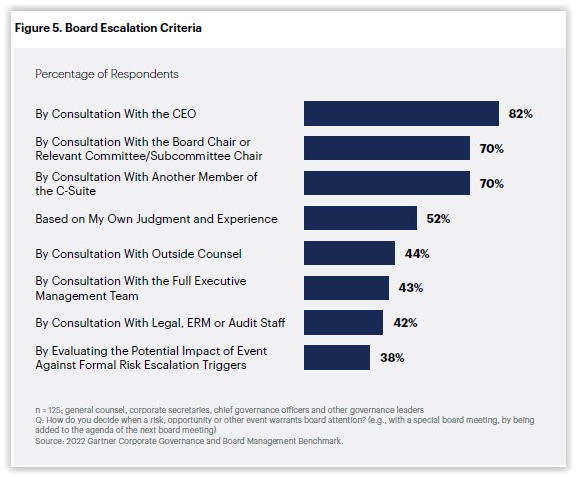Gartner’s report on its recent Corporate Governance and Board Management Survey of 125 general counsel, corporate secretaries, and other governance professionals across company sizes and industries revealed noteworthy benchmarking data on board and corporate governance practices, accompanied by guidance on how to address perceived gaps between current and “best” or better practices.
Board & committee meeting agendas—The vast majority of respondents (87%) are involved in board and committee meeting agenda-setting; however, only 51% say that the meeting agendas allot an appropriate amount of time for unstructured discussion. While the percentages of respondents that say the agendas allot the appropriate amount of time to each topic and address the right topics are much higher (70% and 85%, respectively), the report focuses on filling the gaps between the survey results and the ideal (100%) and creating more “white space” on the agendas.
Board presentations—Just over half of respondents reported reviewing executive presentations to the board, which are a key source of information for board decision-making.
Board/director “management”—Respondents’ perceived effectiveness at conducting or facilitating a wide range of board management activities—including agenda planning, charter updates, board packet and preread materials, director onboarding, director evaluation, and director education—varied from 38% to 87%, with sourcing and recruiting directors and director education bringing up the rear at 38% and 44%, respectively. In contrast, respondents perceived themselves highly effective at agenda planning and board and committee charter updates (each at 80%).
Risk escalation to the board—In the context of a majority of boards reportedly having increased their risk appetite over the past couple of years, just 38% of respondents indicated that they use formal risk escalation triggers to determine when to raise a risk, opportunity, or other issue to the board.
 Board ESG expertise—While more than half of respondents said director ESG experience and expertise are important, only 30% of boards reportedly have such expertise. More than half of boards either require director education on ESG (17%) or plan to provide it (37%).
Board ESG expertise—While more than half of respondents said director ESG experience and expertise are important, only 30% of boards reportedly have such expertise. More than half of boards either require director education on ESG (17%) or plan to provide it (37%).
Access additional resources on our Board Practices/Governance Practices page and other relevant resource pages.
This post first appeared in the weekly Society Alert!